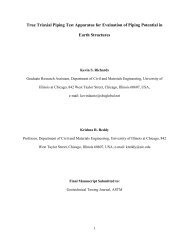Toward a Useful Theory of Mentoring: A Conceptual Analysis and ...
Toward a Useful Theory of Mentoring: A Conceptual Analysis and ...
Toward a Useful Theory of Mentoring: A Conceptual Analysis and ...
Create successful ePaper yourself
Turn your PDF publications into a flip-book with our unique Google optimized e-Paper software.
nub <strong>of</strong> the problem with the mentoring concept. For this reason, it is perhaps the thorniest<br />
<strong>of</strong> the questions we raise.<br />
Let us begin with a part <strong>of</strong> this issue that can be resolved by stipulation. In the<br />
above vignette, David imparted knowledge that was <strong>of</strong> little interest to Georgeknowledge<br />
about <strong>of</strong>fice politics <strong>and</strong> knowledge, perhaps rumors, about deviant (from the<br />
st<strong>and</strong>point <strong>of</strong> organizational norms) behavior. We can simply stipulate (or not) that<br />
unwanted knowledge nevertheless qualifies as a basis for mentoring. We can also<br />
stipulate (or not) that the information transmitted must be true.<br />
More problematic by far is the fact that knowledge does not place itself into<br />
discrete bins. How does one distinguish between typical training <strong>and</strong> mentoring? In many<br />
cases bosses are formally required to train subordinates. But when, if ever, does the<br />
training relationship transmute into a mentor relationship? The same might be said for<br />
socialization. Peers inevitably impart knowledge, by example <strong>and</strong> usually more directly.<br />
Under what circumstances is this “peer mentoring” <strong>and</strong> under what circumstances is it<br />
“socialization?”<br />
Question: Can groups mentor individuals? The foregoing question raised<br />
another. Is mentoring best viewed as a relation between two people or among a group <strong>of</strong><br />
people? Kram’s (1985) early influential work was based on dyads. The preponderance <strong>of</strong><br />
the mentoring research focuses on dyadic relationships (Auster, 1984; Eby & Allen,<br />
2002; Kram 1985; Ragins & Sc<strong>and</strong>ura, 1997). Today, however, researchers define<br />
mentoring to include group mentoring (Dansky, 1996) <strong>and</strong> peer mentoring (Bozionelos,<br />
2004; Kram & Isabella, 1985). More recently Eby (1997) <strong>of</strong>fered a typology that exp<strong>and</strong>s<br />
mentoring to include alternative forms <strong>of</strong> group mentoring such as inter-team, intra-team,<br />
14



